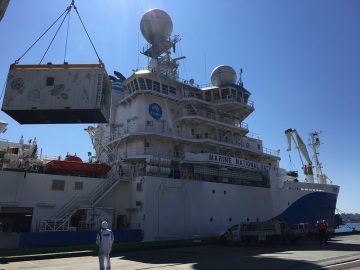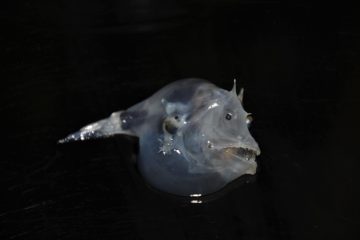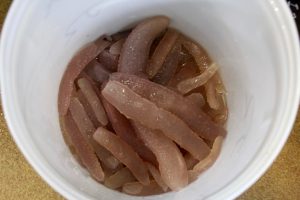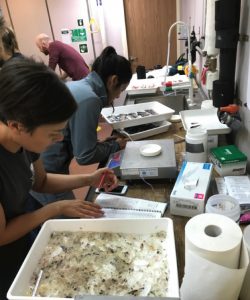
Loading equipment onto the RV Investigator.
Photo ©Lian Kwong, UBC
UBC PhD candidate Lian Kwong, and postdoctoral research fellow Dr. Natasha Henschke recently participated in a scientific voyage on board the Australian research vessel Investigator, under the supervision of Professor Evgeny Pakhomov, Principal Investigator and Director of UBC’s Institute for the Oceans and Fisheries. This research voyage, titled “The whole enchilada: from production to predation in Tasman Sea ecosystems,” was led by Chief Scientist, Professor Iain Suthers, and focused on establishing the relationship between open ocean production and coastal fisheries off southeastern Australia.
Over the three-week period, onboard researchers sampled different oceanographic habitats for phytoplankton, zooplankton and larval fish, larval lobster, and small fish. Surveys were also conducted to quantify the birds and cetaceans in the area. Sampling methods included the use of multi-frequency echo sounders, CTD casts, Triaxus tows with an attached laser optical plankton counter, plankton nets and trawls down to 500 and 1000m deep. Several interesting organisms were identified in the deep net trawls, including various anglerfish species such as the ghostly seadevil (Haplophryne mollis), often with a parasitic male attached.

Haplophryne mollis with parasitic male attached. Photo ©Lian Kwong, UBC
Kwong is working Prof. Pakhomov and fellow Principal Investigator Dr. Jason Everett of the University of New South Wales on assessing active carbon transport of mesozooplankton and micronekton in the Tasman Sea.
“The animals that we’ve been sampling undergo the world’s largest migration – from the deep ocean to the surface of the ocean at night to feed,” said Kwong. “In combination with our depth stratified tows, we will also be looking at the acoustic data with Dr. Sven Gastaeur (University of Tasmania). This will help us figure out precisely which animals are migrating in the water column, and how deep they are going.”
Additional research involving pelagic tunicates (salps and pyrosomes), that were opportunistically captured onboard, will be led by Dr. Henschke to supplement her current postdoctoral work with Prof. Pakhomov on Southern Ocean salps.

Pyrosomes. Photo ©Lian Kwong, UBC
“While pyrosomes were not a major focus of this voyage, their mass abundance mirrors recent swarms that were seen off the coast of Oregon and Washington earlier this year,” she said. “It is interesting that these organisms can form such dense swarms, yet we still know so little about their basic ecology, and what causes these swarms. Hopefully we can use this data to link their occurrence to environmental drivers.”
Dr. Brian Hunt, Assistant Professor in UBC’s Institute for Oceans and Fisheries, is also a collaborator on the project, and is focusing on using stable isotopes to understand food web dynamics.

Lian and Natasha working hard at sea. Photo ©Iain Suthers, UNSW.
The voyage was an international collaboration involving ten institutions: University of British Columbia (Canada), Fisheries and Oceans (Canada), University of New South Wales (Australia), University of Tasmania (Australia), Curtin University (Australia), University of Technology Sydney (Australia), University of Auckland (NZ), Auckland Museum (NZ), Taronga Zoo (Australia) and CSIRO (Australia).
This research was supported by a grant of sea time on Investigator from the Marine National Facility. The Marine National Facility is owned and operated by CSIRO on behalf of Australia.
Tags: Brian Hunt, Evgeny Pakhomov, faculty, fieldwork, fish, IOF postdoctoral fellows, IOF students, ocean ecology, plankton, pyrosomes